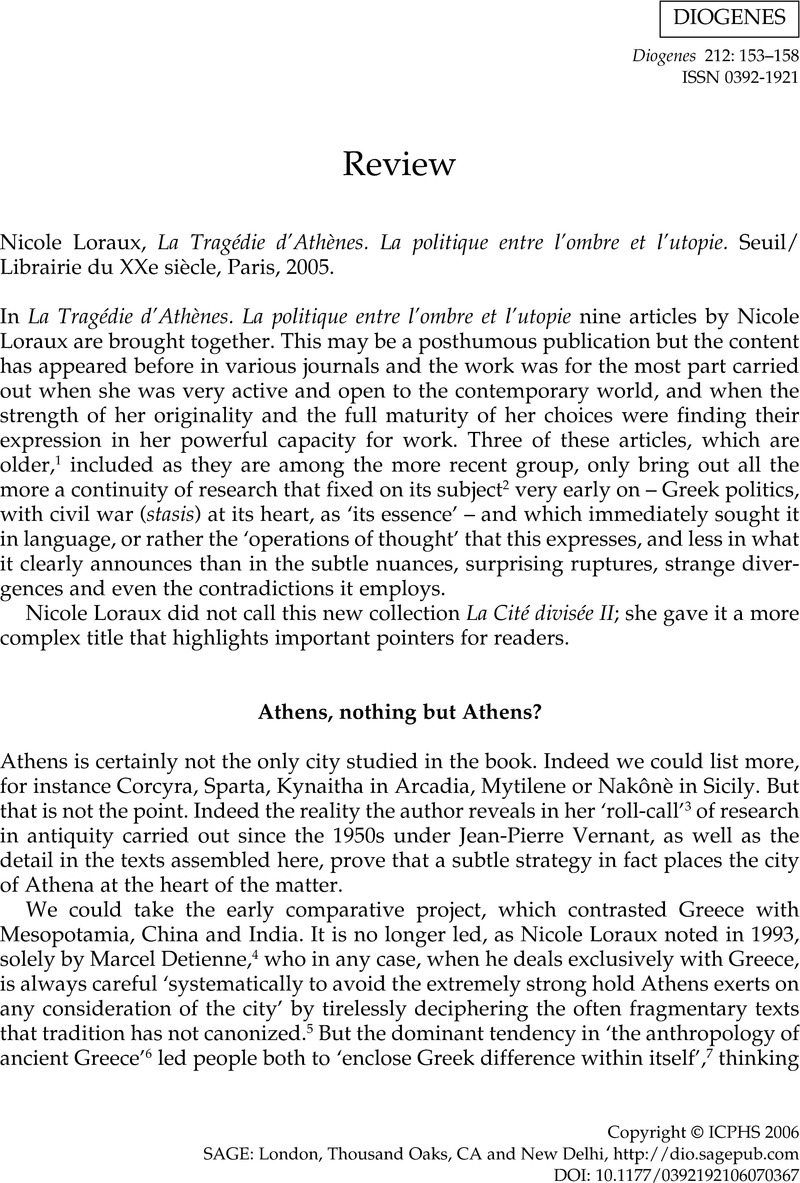No CrossRef data available.
Article contents
Nicole Loraux, La Tragédie d’Athènes. La politique entre l’ombre et l’utopie. Seuil/Librairie du XXe siécle, Paris, 2005.
Review products
Published online by Cambridge University Press: 28 February 2024
Abstract

- Type
- Review
- Information
- Copyright
- Copyright © ICPHS 2006
References
Notes
1. ‘Solon au milieu de la lice’ (1984), pp. 199-214; ‘Thucydide et la sédition dans les mots’ (1986), pp. 95-134; ‘Cratyle à l’épreuve de la stasis’ (1987), pp. 49-69.
2. ‘Thucydide et la sédition dans les mots’, p. 81.
3. ‘Back to the Greek?’, pp. 9-29.
4. In the next generation I would add Christian Jacob who collaborated on the comparative volume edited by M. Detienne, Transcrire les mythologies. Paris: Albin Michel, 1994, and whose current research on educated worlds and practices and material vectors of knowledge compare cultures systematically and extensively; and part of the recent work by François de Polignac who, with regard to Alexandria for instance, compares Greek and Arab traditions.
5. Jesper Svenbro also illustrates very well a similar trend.
6. The title given by Jean-Pierre Vernant to a collection of articles by Louis Gernet which was published by Maspero in 1968 and also resulted in the research he led at the Centre de recherche comparée sur les sociétés anciennes being defined as research in historical anthropology.
7. ‘Back to the Greek?’, p. 25.
8. ‘Solon au milieu de la lice’, pp. 145-56.
9. ‘Cratyle à l’épreuve de la stasis’, pp. 109-17.
10. However the first part of the article ‘La cité grecque pense l’un et le deux’, pp. 125-43, subtitled ‘Une cité idéalement une’, reminds us of its components. But we should point out that in doing so Nicole Loraux is then detained by another problem which remained central to her work: that of thinking the city as a subject, when the autonomy of Greek politics is posited, by opting to make it the result of a series of operations of thought and imaginary solutions consisting of ‘denial, repression and forgetting, in preference to consciousness’ (p. 143).
11. Né de la terre. Mythe et politique à Athènes. Paris: Seuil, 1996.
12. See the article ‘La guerre civile grecque et la représentation anthropologique du monde à l’envers’, pp. 61-79, in which N. Loraux shows that it is incorrect to assimilate civil war to becoming animal, but that stasis borrows the very gestures of sacrifice on which the city is based and reveals the human creature (anthrôpos), exposed to ‘human nature’, in the male citizen (anêr).
13. ‘La tragédie et l’antipolitique’, La voix endeuillée. Essai sur la tragédie grecque, Paris, Gallimard, 1999.
14. On repetition see pp. 188-90: ‘Pour une histoire du répétitif’.
15. In this connection see N. Loraux’s article, which I consider crucial: ‘L’homme Moïse et l’audace d’être historien’, Le cheval de Troie 3, pp. 83-98.




